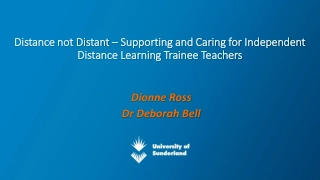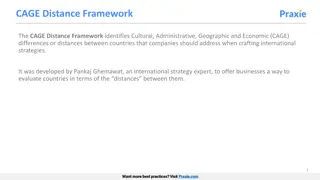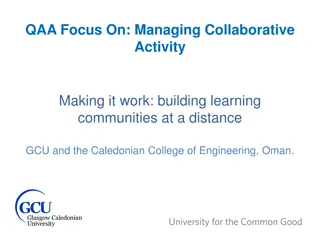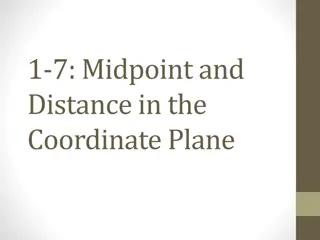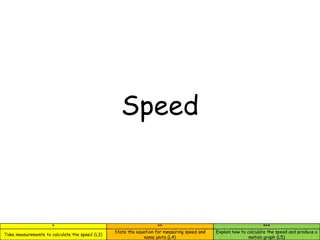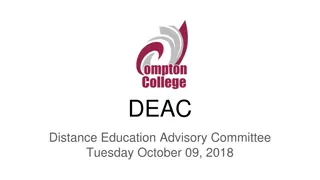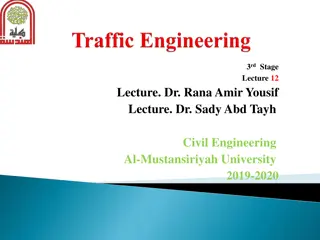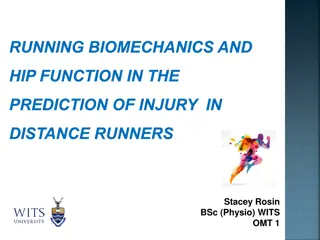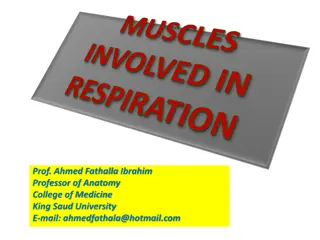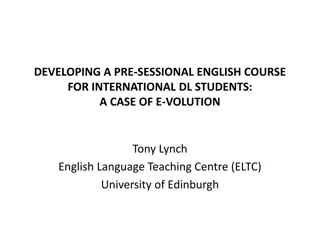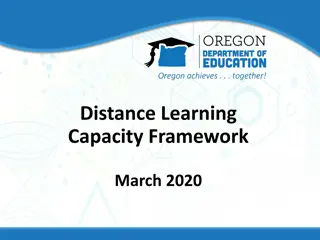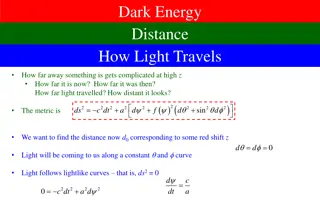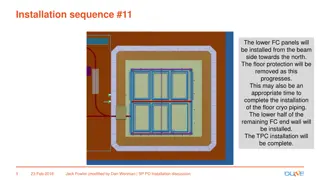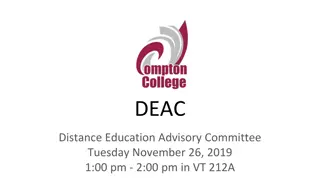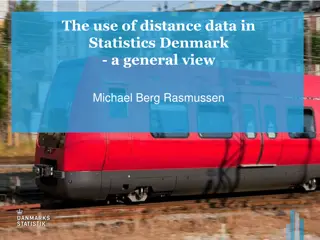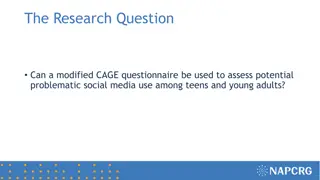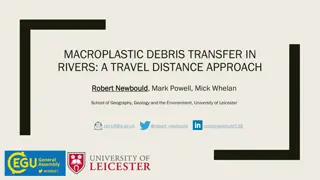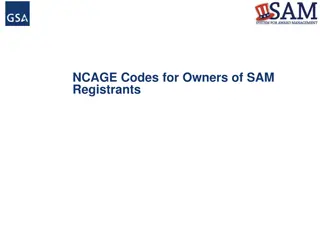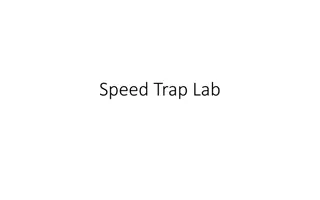wepik-empowering-through-dayitwa-education-and-bca-20240305095445EHd7The Dayitwa
The Distance Learning Centre in Delhi is a place where people can pursue their studies through distance education. This type of educational institute is located in Satya Niketan. It offers distance education courses in various fields, such as IT management and business. Education is an essential par
3 views • 8 slides
Enhancing Support for Distance Learning Trainee Teachers through Comprehensive Student Support Systems
Effective student support is crucial in the success of distance learning trainee teachers. This research explores the importance of supporting independent learners, the methodology used, and strategies for providing comprehensive student support to improve retention and academic outcomes in distance
0 views • 16 slides
Edit Distance
Edit distance, a crucial concept in Computational Biology and NLP, measures the minimum number of operations needed to transform one string into another. It is widely used for tasks such as spell correction, aligning nucleotide sequences, evaluating machine translation, and speech recognition. By co
3 views • 23 slides
Distance and Displacement in Science
Exploring the concepts of distance and displacement in science, this content covers the difference between scalar and vector quantities, methods for determining displacement and distance, and examples of scalars and vectors. It also delves into the fundamental definitions of distance and displacemen
0 views • 21 slides
Cage Culture in Aquaculture
Cage culture involves cultivating fish in meshed boxes submerged in water bodies like rivers, lakes, estuaries, and seas. Originating about 200 years ago, it has evolved into an intensive aquaculture method. Components like cage frame, floats, sinkers, and nets play crucial roles in this farming tec
2 views • 16 slides
Poly Phase Induction Motor Construction
An induction motor is comprised of a stator and rotor, with the stator featuring a 3-phase winding fed from a 3-phase supply. The rotor comes in two types - squirrel-cage and phase wound. The squirrel-cage rotor consists of heavy bars tightly pressed on the shaft, while the phase wound rotor has a 3
2 views • 47 slides
The CAGE Distance Framework for International Business
The CAGE Distance Framework, developed by Pankaj Ghemawat, helps companies assess Cultural, Administrative, Geographic, and Economic distances between countries when crafting international strategies. By considering these factors, businesses can identify implications for their strategy and project.
0 views • 4 slides
Distance, Speed, and Acceleration in Physics
Explore the concepts of distance, speed, and acceleration in physics with practical examples and calculations. Learn how to calculate speed, interpret distance-time graphs, differentiate between speed and velocity, and understand acceleration through scenarios involving various moving objects. Gain
9 views • 12 slides
Constructing Perpendiculars: Shortest Distance to a Point
Learn how to find the shortest distance from a point to a line, ensuring the path taken is efficient and direct. By constructing a perpendicular from the point to the line, you guarantee the shortest possible route, creating a right angle with the line. Explore the process of constructing perpendicu
3 views • 17 slides
Electronic Distance Measurement in Surveying
Electronic Distance Measurement (EDM) is a precise method for measuring distances between two points using electromagnetic waves. It offers speed and accuracy, especially useful for long or inaccessible distances. EDM, a type of surveying instrument, measures phase changes in energy waves traveling
1 views • 7 slides
Building Learning Communities at a Distance: Case Study of GCU and the Caledonian College of Engineering, Oman
Managing collaborative activity in distance learning settings involves establishing strong relationships, addressing initial challenges, taking remedial actions, and developing sustainable support systems for expansion. This case study highlights the journey of GCU and the Caledonian College of Engi
0 views • 24 slides
Midpoint and Distance in Coordinate Plane
This content covers the concepts of finding midpoints and distances in the coordinate plane. It explains how to calculate the midpoint of line segments on a number line and in a coordinate plane using the midpoint formula. Additionally, it discusses finding the distance between two points using the
0 views • 7 slides
Study on the Relationship Between Release Distance and Bounce Distance of Golf Ball
Experiment investigating how the release distance affects the bounce distance of a golf ball from bounce one to bounce two. The hypothesis suggests that a greater release distance will result in the ball traveling farther. Controlled variables include the angle of the ramp, ball, height, and surface
0 views • 13 slides
Experiment on Golf Ball Bounce Distances
This experiment explores how the release distance affects the bounce distance of a golf ball, showing that a higher release distance leads to a greater distance between bounces. By conducting controlled drops and measurements, the hypothesis regarding the impact of momentum on the ball's travel dist
0 views • 10 slides
Minimum Edit Distance in Computational Linguistics
Edit distance, such as Levenshtein distance, quantifies the similarity between strings by counting operations needed for transformation. It finds applications in spell correction, DNA sequence alignment, machine translation, and speech recognition. The minimum edit distance measures the minimum numb
0 views • 40 slides
Speed and Motion: Equations, Calculations, and Graphs
Speed is defined as the distance traveled per unit of time and is measured using the equation Speed = Distance/Time, with units typically in meters per second (m/s). To calculate speed, measure the distance traveled and the time taken. Motion graphs can be used to visualize speed by plotting time on
2 views • 11 slides
DEAC Distance Education Advisory Committee Updates
The DEAC Distance Education Advisory Committee met on October 9, 2018, discussing various agenda items such as voting members, faculty satisfaction surveys, updates on Compton College Distance Education programs, and action items regarding certification processes for online and face-to-face faculty
0 views • 12 slides
University of Rochester Animal Resource (AR) Cage Bar-coding System Overview
The University of Rochester Animal Resource (AR) started using barcodes for tracking census data in December of 2005. Barcoding cages helps in providing timely and accurate census data, as well as tracking room capacity. Each cage card or barcode contains specific information like PI name, Protocol
0 views • 16 slides
Sight Distance and Stopping Sight Distance in Traffic Engineering
Sight distance is crucial for drivers to spot obstacles and pass safely on highways. Stopping Sight Distance (SSD) is the minimum distance required for a vehicle to stop before reaching a stationary object. Factors affecting SSD include reaction time, speed, and road conditions. Passing Sight Distan
1 views • 15 slides
Hip Function and Biomechanics in Predicting Injury for Distance Runners
This study delves into the relationship between proximal hip stability, biomechanics, and hip function in predicting injuries among distance runners. Highlighting the prevalence of running injuries and the significance of hip strength, it aims to establish injury predictors for South African distanc
0 views • 26 slides
Mechanics of Pulmonary Ventilation and Respiratory Cycle Explained
Understanding the mechanics of pulmonary ventilation is crucial for comprehending the breathing process. This comprehensive overview covers the role of muscles, ribs, pressure changes in alveolar, pleural, and transpulmonary regions, terms related to breathing and ventilation, and the contraction an
0 views • 31 slides
Thoracic Cage and Respiratory Movements in Anatomy Lecture
Professor Ahmed Fathalla Ibrahim, a renowned Professor of Anatomy at King Saud University, covers the components of the thoracic cage, articulations, respiratory movements, and muscles involved in breathing in this informative lecture. Learn about the structure of the thoracic cage, articulations li
0 views • 24 slides
Enhancing English Language Support for Online Distance Learning Students at University of Edinburgh
University of Edinburgh's English Language Teaching Centre developed an Online Academic Presessional Language course (OPAL) to support Online Distance Learning (ODL) students. The course focused on academic writing to enhance written accuracy and appropriacy, using existing ELTC materials. Research,
1 views • 27 slides
Distance Learning Capacity Framework & Guiding Principles for Online Education
The Distance Learning Capacity Framework and Guiding Principles for online education emphasize safety, wellness, equity, and innovation in the educational process. It stresses the importance of connectivity, technology, educator efficacy, and student proficiency in online learning. These principles
1 views • 11 slides
Maximizing Projectile Distance with Trebuchet Release Points
Experiment conducted to determine the optimum release point on a trebuchet arm for maximum projectile distance. Hypothesis stated that the projectile would travel farthest when released at the longest point. Limited prior research on trebuchet arm length and its impact on distance. Materials used in
0 views • 15 slides
Dark Energy and Luminosity Distance in Cosmology
Exploring the concepts of dark energy, luminosity distance, and how light travels through the universe at varying distances and redshifts. The formula and implications of distance measurements using Hubble's Law and luminosity distances are discussed, along with the impact of matter presence, univer
0 views • 15 slides
Distance Bounding: Facts, Hopes, and Perspectives
Delve into the world of distance bounding with Maria Cristina Onete as she discusses the secure authentication, relay attacks, distance-bounding protocols, properties, and attacks. Learn about the challenges and implementations of mobile distance bounding, mafia and terrorist fraud resistance, and h
0 views • 34 slides
Modular Field Cage Installation Sequence Overview
This installation sequence outlines the step-by-step process for installing the lower FC panels, completing the TPC installation, and mounting the modular field cage components. It includes the placement of beams with standoffs, translation of GP planes, mounting of profiles/racetrack modules, and m
1 views • 14 slides
Distance Education Trends and Data Analysis for 2020-21 Academic Year
Explore the trends and statistics in distance education for the academic year 2020-21, including modalities like online, hybrid, and broadcast education. The report covers aspects such as emergency transitions to online learning, YCCD courses and sections by modality, and total FTES for distance edu
0 views • 25 slides
DEAC Distance Education Advisory Committee Meeting Overview
The DEAC Distance Education Advisory Committee meeting held on November 26, 2019, covered various important agenda items such as call to order, voting members, previous meeting minutes approval, updates on guided pathway division reports, curriculum updates, and workgroup reports. Key topics discuss
0 views • 26 slides
Utilizing Distance Data in Statistics: Insights from Denmark
Exploring the essential role of distance data in statistical analysis, this content sheds light on various methods such as pure distance measurements, proximity analysis, and distance calculations between different points like summer cottages and coastal lines in Denmark. From analyzing catchment ar
0 views • 9 slides
Distance as a Barrier to Healthcare Access for Individuals with Recent Homeless Experience
The study explores the impact of geographic distance on healthcare access for individuals with recent homeless experience. It assesses the association between distance to VA facilities and perceived barriers to care, as well as the relationship between perceived distance barriers and utilization of
0 views • 25 slides
Forces and Stopping Distances in Vehicle Safety
Explore the forces that oppose vehicle motion, and learn about thinking distance, braking distance, and stopping distance. Discover how factors affect these distances, such as friction and reaction time. Gain insights into how friction helps in braking systems and the impact of accelerating or braki
0 views • 16 slides
Assessing Problematic Social Media Use Among Teens and Young Adults Using a Modified CAGE Questionnaire
MyVoice, a longitudinal mixed methods study, examined the use of a modified CAGE questionnaire to assess potential problematic social media use among youth aged 14-24 in the US. The study found that using a CAGE-style questionnaire could help clinicians initiate conversations beyond just screen time
1 views • 5 slides
Gate Scheduling at Airports: Optimization and Solutions
Allocating gates efficiently at airports is crucial for managing air traffic. Gate scheduling involves assigning flights to stands while considering constraints and objectives like minimizing un-gated activities and passenger walking distance. Various methods such as linear programming, heuristics,
0 views • 11 slides
Macroplastic Debris Transfer in Rivers: A Travel Distance Approach
Existing methods for studying plastic transport in rivers often overlook displacement and storage processes. This study presents empirical data on macroplastic tracer transport in a river reach, along with a numerical model to predict travel distance distributions. Tracer experiments using plastic b
0 views • 6 slides
CAGE and NCAGE Codes in U.S. Federal Contracting
The U.S. Federal Acquisition Regulation (FAR) mandates that potential contractors register in the System for Award Management (SAM) to receive federal contracts. A new regulation effective since 2014 requires offerors to disclose owner details, including Immediate Owner and Highest-Level Owner, with
0 views • 12 slides
Practice Questions on Speed and Distance with Solutions
Practice solving speed and distance problems with the provided solutions for scenarios involving a bullet, Bill jogging, and an airplane journey from New York to Los Angeles. Understand how to calculate speed, average speed, and arrival time based on distance and time measurements. Improve your arit
0 views • 34 slides
Speed and Distance Estimation in Speed Trap Lab
Dive into the world of speed and distance estimation with the Speed Trap Lab. Learn how to calculate speed and distance, taking into consideration uncertainties and variations in time measurements. Explore the relationship between distance, time, and speed through engaging visual aids and practical
0 views • 4 slides
Factors Affecting Depth of Field for SEM Imaging
Depth of Field (DOF) is crucial in SEM imaging, determining the distance between the nearest and farthest objects that appear sharp in an image. Factors such as working distance, aperture size, and magnification play key roles in influencing DOF. Increasing the working distance and reducing the aper
0 views • 8 slides

